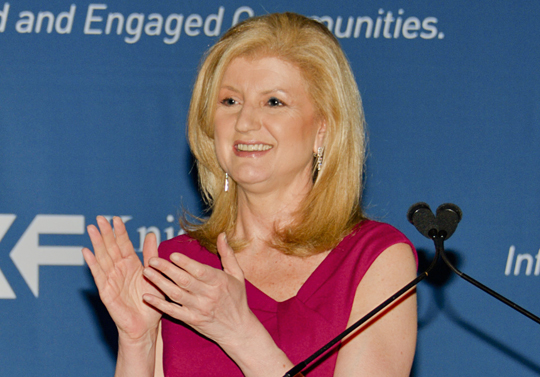Arianna Huffington is launching the UK version of her American blog-orientated news site the Huffington Post this week, and the move has sparked debate in the blogosphere.
Huffington launched the Canada arm last month, but Huffington Post UK will be the site’s first foray outside of North America, with a French version set to follow soon.
Speaking to Ian Burrell for the Independent, Paul Bradshaw, professor of online journalism at City University comments about the difference between UK and US media landscapes that may require a different approach.
“It’s going to be hard for The Huffington Post to communicate what they stand for,” says Bradshaw, who is not inclined to blog for the site. “In the UK they are known as the site that sold to AOL. In the US they might have been known as the site that offered an alternative voice but there’s a different media landscape over here.”
In the same piece, Brian Cathcart, who teaches journalism at Kingston University, adds:
“They will need some new ideas, some really inspired appointments, and to discover some talent. It doesn’t seem that the existing model in the US would offer us anything terribly exciting and new over here.”
Paul Bradshaw may not be persuaded to write for the site but blogger and podcaster Neville Hobson is. In a post titled On board with The Huffington Post UK, Hobson writes that he relishes being part of “a grand experiment”.
So what’s in it for me? To a great extent, I see it as being part of a grand experiment, contributing my opinion and commentary on topics that interest me and that will be published in an online medium that has huge scale and reach. It offers an opportunity for such opinion and commentary to reach many people who, frankly, would be unlikely to visit my blog.
It also means that I’ll be writing for a mainstream medium. That traditionally means you need to be a journalist, which I’m not. I don’t know yet who any of the other bloggers are who’ll be writing for the UK edition, but my guess is that a majority will not be journalists.
Overseas expansion does of course mean a clutch of new hires, but Bobbie Johnson of GigaOm views the operation as “low-risk”, and points to several reasons why.
Well, first, that Huffington Post UK is looking — on the surface, at least — more like a reworking of the current AOL UK operation than a brand new entity. That’s a low-risk strategy, but as I’ve previously argued, it might take more to make an impact in a highly competitive media market like Britain.
Secondly, it’s interesting that this team consists almost exclusively of young journalists, with very few of the high-level, experienced hands that Huffington has made a great play of luring over in the United States. There’s no equivalent, for example, to the likes of political heavy-hitter Howard Fineman, brought over from Newsweek, media reporting veteran Michael Calderone from Yahoo or award-winning reporter Trymaine Lee from the New York Times.
I asked my Twitter followers what they thought of the project, and received a variety of responses.
Adam Tinworth, Editorial Business Manager for Reed Business Information pointed out the possible disruption created by the launch.
Graphic designer and student journalist Jonathan Frost was very enthusiastic.
While subeditor Paul Wiggins was rather more succinct.
Finally, if you want to get involved in blogging for the Huffington Post when it hits UK shores, food journalist Andrew Webb has helpfully published the full requirements on his blog.
For now you can follow their progress via the dedicated Twitter account @HuffPostUK, whose first tweet had a distinctly non-UK feel to it.
https://twitter.com/#!/HuffPostUK/status/87857781633335296
Image of Arianna Huffington by Knight Foundation on Flickr. Some rights reserved.
Disclosure: Joseph Stashko is a blogger for Huffington Post UK.



